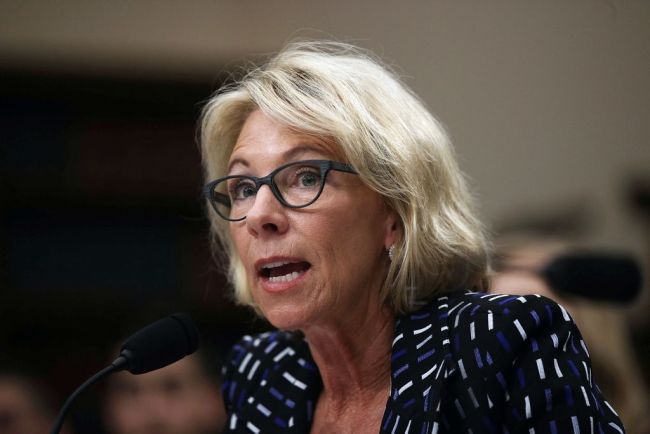You have /5 articles left.
Sign up for a free account or log in.

Education Secretary Betsy DeVos testifying to House appropriators.
Getty Images
Education Secretary Betsy DeVos plans to overhaul restrictions on religious colleges’ access to federal student aid in the next round of deregulation at the Department of Education.
What that means for particular federal programs, though, is unclear -- religious institutions are already among the biggest recipients of federal student financial aid, and the department did not offer any details Wednesday about its aims in revisiting federal rules, beyond the language contained in the release of its spring regulatory agenda.
The department said it would appoint a rule-making panel to negotiate changes to those restrictions to student aid programs, according to the documents outlining that agenda, and the department itself could amend regulations involving federal grants or participation in state-run programs.
Another proposed rule change addressed eligibility of "faith-based institutions" for higher ed and student aid programs.
The broader deregulation plans in those documents address a range of higher education policy issues, from campus sexual assault to accreditation and state oversight of institutions. The documents also note that the department will move ahead with plans to overhaul the Obama-era borrower-defense and gainful-employment rules after rule-making committees failed to reach agreement earlier this year on new versions of those regulations.
Religious colleges welcomed the new indication that the department would scrutinize rules affecting them.
“We appreciate Secretary DeVos’s commitment to ensuring students are able to obtain quality educations at the institutions of higher education that will best serve their needs, including religious colleges and universities,” said Shirley V. Hoogstra, president of the Council for Christian Colleges & Universities. “Eliminating or revising regulations that impose undue and outdated restrictions on religious institutions is an important and welcome development.”
And Michael Galligan-Stierle, president and CEO of the Association of Catholic Colleges and Universities, said higher ed institutions manage a “steady stream of governmental regulations” that can drive up costs.
Neither group pointed to specific regulations they hoped to see addressed by the department.
The biggest stakes in federal postsecondary policy often involve rules governing which colleges get access to Title IV aid, which includes federal student loans and Pell Grants. And religious institutions like Liberty University are among the top recipients of Title IV funds.
A review of federal regulations affecting religious institutions may include programs like Federal Work-Study, which employs college students in both on- and off-campus jobs, or GEAR UP, which funds partnerships to prepare low-income and first-generation students for college.
Regulatory language prohibits the use of Federal Work-Study funds for work involving the construction or maintenance of religious worship facilities, while regulations prohibit “pervasively sectarian” higher education institutions from being the lead on any GEAR UP partnership.
But Alex Chough, vice president for government relations at the National Council for Community and Education Partnerships, which advocates for GEAR UP, said he was not aware of any institution expressing concerns that regulations around the program are overly restrictive.
GEAR UP programs can team up with faith-based organizations to do outreach for activities like FAFSA completion workshops. And they can also serve low-income students attending private schools as long as the content of the program is secular and nonideological.
“After nearly 20 years, we haven’t heard of any objections to the existing regulations,” he said.
The goal of the department’s review, according to the documents posted Wednesday, is to make regulations consistent with current law. A Supreme Court ruling last year deemed unconstitutional a state law on the books in Missouri barring religious institutions from state programs with a secular intent. A memo from Attorney General Jeff Sessions last year also directed federal agencies to look for ways to improve religious protections.
Barmak Nassirian, director of federal relations and policy analysis at the American Association of State Colleges and Universities, said it was hard to tell what exactly the department had in mind.
“I tend to see this as more symbolic than substantive,” he said.




